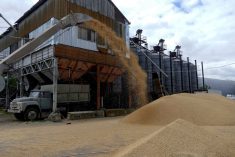Development of Canada’s Food Policy is taking a major step forward with the naming Friday of a new advisory council featuring industry, academic and government members tasked with guiding the policy.
Public consultations on a “Food Policy for Canada” started in 2017, leading to the release of a 2018 report from Agriculture and Agri-Food Canada highlighting what was heard. The government in 2019 dedicated about $134 million to support the policy’s development and the creation of a national food system.
There are four pillars to the policy:
Read Also

Bunge beats profit estimates on strong processing margins, Viterra boost
Bunge Global topped Wall Street estimates for third-quarter adjusted profit on Wednesday with the closing of its acquisition of Viterra in July boosting volumes as oilseed processing margins improved, sending shares up 2.6 per cent.
- helping Canadian communities access healthy food;
- making Canadian food the top choice at home and abroad;
- supporting food security in Northern and Indigenous communities; and
- reducing food waste.
The new council is to report to Agriculture Minister Marie Claude Bibeau and “bring together the expertise and diversity within the food system to address both the challenges of today and the future,” the government said in a release.
In total, 23 members were announced for the council, which will meet virtually for the first time March 4. Its co-chairs will be Evan Fraser, director of the University of Guelph’s Arrell Food Institute, and Sylvie Cloutier, CEO of the Conseil de la transformation alimentaire du Quebec, a body representing food processors.
Other council members include Canadian Federation of Agriculture president Mary Robinson; Marcel Groleau, president of Quebec’s Union des producteurs agricoles (UPA); Yukon Agriculture Association president Sonny Gray; B.C. farmer and researcher Connor Williamson; and B.C. ag sector consultant Brenda Schoepp, a columnist for Alberta Farmer.
Fraser, in particular, is expected to be a leading voice on the committee; he was one of the first voices in Canada who proposed the federal government create such a council, and maintains a respected voice within the sector.
The food policy “is a roadmap for a healthier and more sustainable food system in Canada,” Bibeau said in announcing the council’s lineup. “The policy brings everyone across our food system together to deliver real, long lasting change,”
Some funding related to those projects is already taking place. For example, a $20 million Food Waste Reduction Challenge was launched in November last year, beginning with a funding envelope of up to $10.8 million for innovators with proposals to help prevent or reduce food waste “at any point from farm-to-plate.”
“More and more we’re seeing food waste as an opportunity as well as a challenge,” said Bibeau.
The government announced last week it had received 343 applications for shares of the $10.8 million, with successful applicants expected to be announced “in the coming months” and additional challenges to be launched later this spring.
On top of helping to implement the food policy, the new council will also help shape Canada’s policy position at the upcoming United Nations Food Systems Summit, Bibeau said.
At that summit, planned for next October, the UN has said it expects to “launch bold new actions to transform the way the world produces and consumes food,” in pursuit of 17 goals laid out in the international body’s 2030 Agenda for Sustainable Development.
— D.C. Fraser reports for Glacier FarmMedia from Ottawa.












